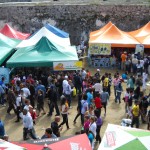Finally, I’m able to concentrate on other things.
As you know, I went to Cuba in February. My next book is set there, and I wanted to fact check some settings as well as Cuban positions on the issues. So I hooked up with a travel agency I highly recommend, btw, and signed up for a group trip centered around the Havana International Book Fair.
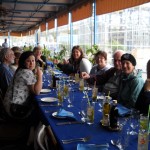
Aside from my daughter, the group was quite literate: librarians, other writers, even a French professor. Have I told you how much I love librarians? They are some of the smartest, craziest, best people to party with—in fact, I think they perpetuate the demure stereotype so people will leave them alone. But I digress.
Our first stop was the book fair itself. It’s important to understand that Cuba sees itself as a center of literature for all of Latin America. Consequently the Fair featured work of authors from plenty of Central and South American countries as well as Cuba.
In a word, it was HUGE. Remember, the literacy rate in Cuba is just about 100% (more about that later), it was a gorgeous Sunday, and it seemed like everyone in Havana – and their families — were there. The Fair was held at one of the oldest fortresses in Cuba, and it was packed. We literally couldn’t move for minutes at a time. The crowds were bigger than ANY book fair I’ve ever been to in the States. Note to Authors who write in Spanish: Carpe Diem!
One of the highlights of the Book Fair was a special presentation to us from a Cuban publisher. Who was also an agent. In fact, it was difficult to tell where one role stopped and the other began. But since the entire book industry is run by the State, it probably isn’t that important.
As you might suspect, the Cuban book industry is very different than ours. Some aspects are actually heartening. For example, the average print run of a book in Cuba is 20,000 copies. The bad news is that authors get very little money compared to capitalist countries. (Then again our advances aren’t so great anymore either, are they?). Every book that’s published in Cuba is required to be sent to every library in Cuba– there are over 500– usually in multiple copies. So if you’re a Cuban author, you are definitely read. (Wish that were the case here…)
We were told there are no limitations on what authors could write.
The next day we visited Cuba’s Library of Congress (The National Library) and met with the director, who talked to us through an interpreter.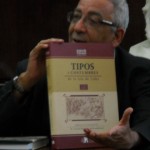 Various State committees decide what’s going to be published. The majority is non-fiction and poetry. We couldn’t see much of the Library itself because it’s undergoing renovations. In fact, lots of places are, although whether they REALLY are or they don’t want us to poke around is another matter. At any rate, the director talked to us about the goals of the library program, one of which is to modernize technology. For example, Venezuela helped Cuba build a cable for high-speed internet. Unfortunately, it doesn’t work. However, on the streets cell phones are becoming more common, so I suspect the post-embargo technology will focus on them. One thing I learned is that the National Library has the largest collection of Napoleonic literature, diaries, and artifacts outside of France. Odd. But fascinating.
Various State committees decide what’s going to be published. The majority is non-fiction and poetry. We couldn’t see much of the Library itself because it’s undergoing renovations. In fact, lots of places are, although whether they REALLY are or they don’t want us to poke around is another matter. At any rate, the director talked to us about the goals of the library program, one of which is to modernize technology. For example, Venezuela helped Cuba build a cable for high-speed internet. Unfortunately, it doesn’t work. However, on the streets cell phones are becoming more common, so I suspect the post-embargo technology will focus on them. One thing I learned is that the National Library has the largest collection of Napoleonic literature, diaries, and artifacts outside of France. Odd. But fascinating.
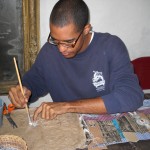 Another highlight was a visit to a small rare-book publisher in Mantanzes. They release only 200 copies of any book they publish, and each one is painstakingly hand-illustrated. Unbelievably beautiful. Some were actually in English as well as Spanish.
Another highlight was a visit to a small rare-book publisher in Mantanzes. They release only 200 copies of any book they publish, and each one is painstakingly hand-illustrated. Unbelievably beautiful. Some were actually in English as well as Spanish.
We also learned about Cuba’s literacy program, which,s ince everyone in Cuba knows how to read, really is something Fidel can crow about. It’s based on a clever but simple premise: Peers teaching peers. Teenagers teach young kids. Adults teach teenagers. And young adults go on teaching stints in rural villages and provinces. Which begs the question: why doesn’t it work here?
The Book Fair lasted all week and some of our group went back. I didn’t — I was busy fact-checking. I’m glad I did. I found a warehouse that I needed in Havana, 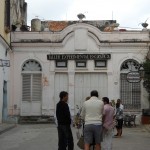 and we went to Regla, which is off the beaten path but is the focus for a couple of chapters in the book. Turns out I got it wrong, so I was thrilled I could correct my mistakes.
and we went to Regla, which is off the beaten path but is the focus for a couple of chapters in the book. Turns out I got it wrong, so I was thrilled I could correct my mistakes.
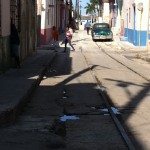
I realize I’ve just scratched the surface. We didn’t ask, nor did anyone offer to talk about any of the opposition writers and how they are treated; we didn’t talk about a free press, although they did admit there was no such thing in Cuba. So there are topics I still want to explore.
Bottom line: the embargo will end soon, and Cubans know it. You can almost taste the anticipation. I just hope that when it does, we don’t exploit Cuba as we did before. In fact, I believe we can learn from some of their systems.
